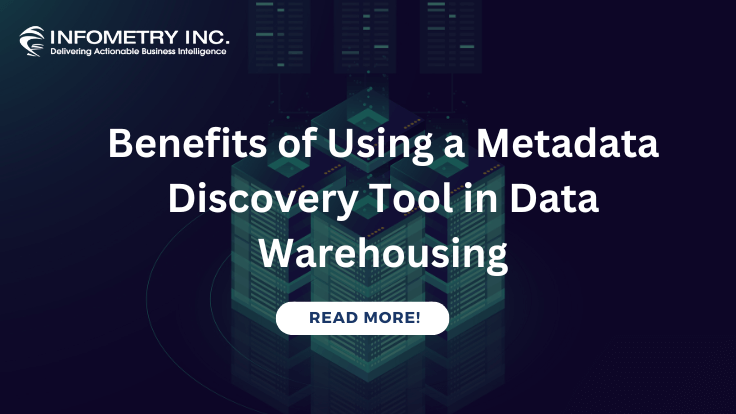
Mastering Analytics with Data Warehousing: A Strategic Approach
March 1, 2024
Delving into Tableau: Unraveling its Uses and Advantages
March 13, 2024In the fast-paced digital era, where data plays a pivotal role in decision-making, the importance of a sound data architecture strategy cannot be overstated. One of the key elements in ensuring the effectiveness of this strategy is maintaining high data quality. In this blog, we will delve into the significance of data quality within a comprehensive data architecture strategy and explore how Infometry, a leading player in the data management space, contributes to achieving and maintaining superior data quality.
Understanding Data Architecture Strategy:
Data architecture strategy involves the design, structure, and organization of an organization’s data assets to meet its information needs efficiently. It encompasses various components, such as data modelling, storage, integration, and governance. A well-defined data architecture strategy is fundamental for ensuring that data is accurate, reliable, and accessible when needed.
The Crucial Role of Data Quality:
Data quality is a critical aspect of any data architecture strategy. Poor data quality can lead to inaccurate insights, flawed decision-making, and erode stakeholder trust. To address this, organizations need a robust data quality management framework integrated into their overall data architecture strategy.
Infometry’s Contribution to Data Quality:
Infometry is a prominent player in the data management domain, offering innovative solutions to enhance data quality. Let’s explore some key aspects of how Infometry contributes to achieving and maintaining high-quality data within a comprehensive data architecture strategy:
Data Profiling and Cleansing:
Infometry provides advanced data profiling tools that analyze and assess the quality of data. By identifying anomalies, inconsistencies, and errors, organizations can initiate targeted cleansing processes. Infometry’s data cleansing capabilities help standardize and enrich data, ensuring its accuracy and reliability.
Data Integration and Governance:
A robust data architecture strategy involves the seamless integration of data from disparate sources. Infometry’s data integration solutions facilitate the smooth flow of data across systems while maintaining consistency and accuracy. Additionally, Infometry emphasizes data governance, ensuring data is appropriately handled, protected, and compliant with regulatory requirements.
Master Data Management (MDM):
Infometry’s MDM solutions play a pivotal role in ensuring a single, consistent version of critical data across the organization. By centralizing master data, organizations can eliminate duplication, reduce errors, and enhance the overall quality of data.
Real-time Monitoring and Reporting:
Infometry’s data quality tools include real-time monitoring and reporting features. This allows organizations to proactively identify and address data quality issues as they arise, preventing the propagation of errors throughout the system.
Conclusion:
In conclusion, a comprehensive data architecture strategy is indispensable for organizations aiming to harness the power of their data assets. Infometry stands out as a valuable partner in this journey, offering cutting-edge solutions to enhance data quality. By incorporating Infometry’s tools into their data architecture strategy, organizations can ensure that their data is not just abundant but is also accurate, reliable, and ready to drive informed decision-making in the dynamic business landscape.




